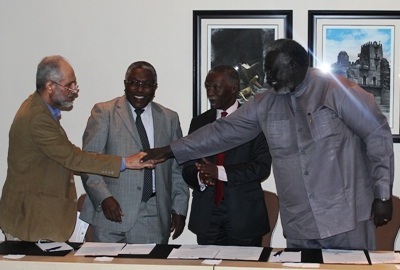Sudan’s RNM describes Bashir’s recent remarks on dialogue as negative development
October 1, 2014 (KHARTOUM) – The leader of the Reform Now Movement (RNM), Ghazi Salah al-Din al-Attabani, has described recent remarks made by president Omer Hassan al-Bashir on the national dialogue as “negative development” holding the ruling National Congress Party (NCP) responsible for them.

He stressed that political forces will meet after Eid al-Adha holiday to discuss other political options away from the evasive stances of the NCP.
On Monday, Bashir strongly attacked the leader of the opposition National Umma Party (NUP), al-Sadiq al-Mahdi, for signing a political agreement with rebel alliance of the Sudan Revolutionary Forces (SRF), saying he can return back to Sudan only if he cancels the Paris Declaration.
He said that Paris Declaration makes al-Mahdi complicit in the rebel project to bring down the regime by force.
Hours after Bashir’s statements the NISS announced its intention to sue al-Mahdi for his participation in “activities against the country”.
In a defiant statement on Tuesday, the NUP secretary general Sara Nugdalla said that al-Mahdi is the last elected legitimate prime minister before the coup d’état that brought Bashir to power in June 1989 adding “we have the legitimacy and you have the power”.
“The head of the coup regime is not entitled to allow or prevent the entry of the legitimate prime minister. His presence abroad depends on missions he is carrying out outside the country, and on the party’s institutions not the regime’s decisions,” the statement further said.
Sources within Sudanese opposition had earlier told Sudan Tribune that Bashir’s remarks and actions of the NISS could abort the already faltering dialogue process, warning against disastrous consequences if the government insists on imposing its political agendas.
Attabani further described assurances made by the government to the United Nations Security Council (UNSC) that dialogue is progressing well as “falsification of facts and abuse of the goodwill of political forces which agreed to participate in the national dialogue”.
Last January, Bashir called on political parties and rebel groups to engage in a national dialogue to discuss ways to bring peace in the country and to discuss constitutional reforms.
Al-Mahdi, who was a fervent supporter of the national dialogue, had been arrested for one month from May to June for criticizing atrocities and war crimes committed by government militias in war zones.
Following his release, he distanced himself from the dialogue process and called for including rebels in the national dialogue. He further called for issuing a law protecting political freedoms before launching the political process.
(ST)
